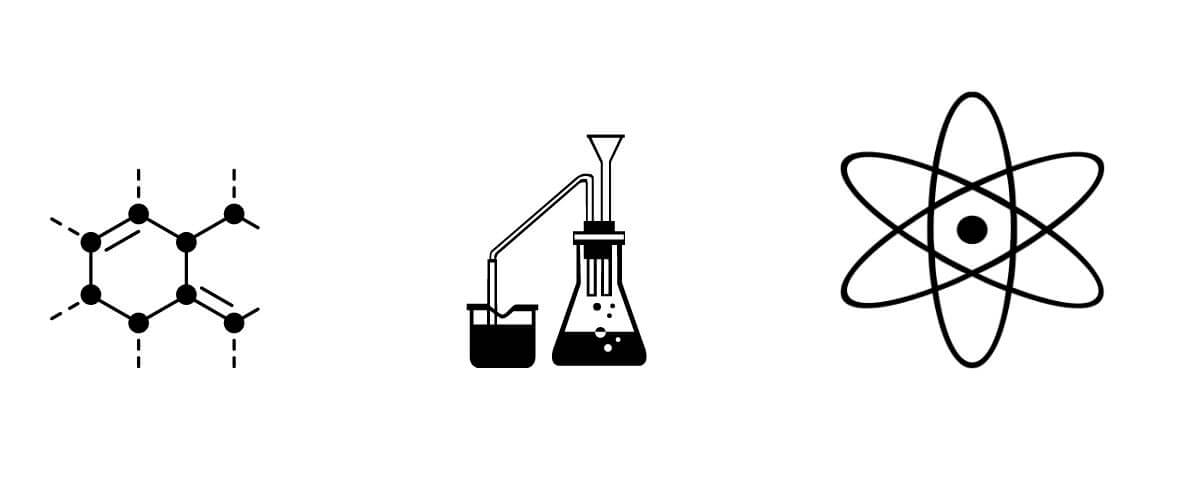
Most people know a bit about chemistry and some of its basic principles, but chemistry has many subdivisions that are less familiar. In the broadest sense, chemistry is the science that deals with the properties, composition, and structure of elements, molecules, and compounds.
Chemists study the transformations that these substances undergo. They are interested in the properties of atoms and the scientific laws governing how they combine and how they interact.
Chemistry’s main goal is to explain and expand the body of knowledge around how substances function, and how the knowledge of these properties can be used to achieve specific purposes. Ultimately, chemists want to develop logical, understandable explanations of why materials behave and appear as they do.
They also ask questions about how interactions between materials can cause changes to these substances. This means that chemistry is foundational to many other branches of science.
What Are The 5 Types of Chemistry?
Chemistry is broken up into 5 different subfields. These subfields may have further specific disciplines within them, but the field’s primary branches all fall into one of the following 5 different types of chemistry: organic chemistry, inorganic chemistry, physical chemistry, analytical chemistry, and biochemistry.
Additionally, the specialized study of chemical reactions may be considered its own branch, but typically reactions are included in the parent field. Furthermore, few labs are set up to only study reactions as an isolated event; it’s more efficient and more useful to study the reactions occurring within your own field.
Here are the 5 branches of chemistry and their definitions, along with some examples of what occurs in each.
1. Organic Chemistry
Organic chemistry is the type of chemistry that studies the molecules of life. All life is composed of only a few types of atoms, primarily carbon, hydrogen, oxygen, and nitrogen.
These atoms are found in all plants and animals and are necessary for life’s survival. Organic chemists study the behavior and structure of molecules made from these atoms.
Of these, carbon is the most important, and understanding the carbon-hydrogen bond is the backbone of organic chemistry.
Organic chemistry is also concerned with creating new organic molecules and developing new reactions that might make these syntheses more efficient. These chemists also identify and explain the physical structures of these new organic molecules and categorize them based on their relationship to existing organic molecules.
What Do Organic Chemists Do?
Organic chemistry has many uses, including the following.
- Creating medication
- Synthesizing nutritional chemicals like flavorings and preservatives
- Manufacturing polymers
- Creating agricultural chemicals like fertilizers and pesticides
Understanding organic chemistry is vital for studying biochemistry and molecular biology, as the molecules studied by organic chemists are the building blocks of life. This is why organic chemistry is required background knowledge for medical careers, as molecules such as proteins, sugars, fats, and the nucleic acids DNA and RNA are all organic molecules.
2. Inorganic Chemistry
Inorganic chemistry is organic chemistry’s counterpart and is the branch of chemistry that studies all inorganic molecules. While some people think that inorganic chemistry never involves carbon, this is not true.
Many inorganic molecules have carbon as a component. Inorganic chemists also study bioinorganic chemistry, which looks at the structures and biological functions of inorganic biological substances.
For example, a bioinorganic chemist might look at iron, which is not organic but is found in blood, and its interactions with other chemicals.
Inorganic chemistry also encompasses the study of catalysts and materials chemistry. Catalysts are chemicals that increase the rate of a reaction without being consumed, which is useful in all branches of chemistry.
Materials chemistry, like other forms of materials science, is concerned with the design and synthesis of new materials.
What Do Inorganic Chemists Do?
Inorganic chemistry’s uses include, but are not limited to, the following:
- Supercomputing material development
- Silicate development
- Electronics manufacturing
- Research and development for technological innovations
Inorganic chemistry is unique in that many inorganic compounds are theoretical, and do not exist naturally. This means that some inorganic chemists are essentially theoretical chemists until they are able to synthesize the new inorganic chemicals themselves.
Inorganic chemists also study the inorganic compounds like oxides and sulfides found in the Earth’s crust.
3. Physical Chemistry
Physical chemistry is the study of the physical principles that determine how atoms and molecules behave. This includes a wide array of topics, such as reaction rates, the way that light and matter interact, stability and reactivity, and electron arrangement.
The primary goal of physical chemistry is to understand what is happening at the atomic level and why it’s happening that way.
Physical chemistry usually combines ideas from several subfields, as all molecules and atoms are affected by the same physical forces. Physical chemistry techniques are applied to such diverse concepts as the mechanisms of organic reactions, collisions and bond rearrangements, protein folding, polymer characterization, or environmental systems and their chemical properties.
What Do Physical Chemists Do?
Some of physical chemistry’s many uses include:
- Superconductor research and development
- High-level supercomputer and electronics development and manufacturing
- Medical research
- Protein synthesis and research
Physical chemists are both researchers and applied scientists. Understanding the physical reactions that occur within compounds is a vital part of all branches of applied chemistry.
4. Analytical Chemistry
Analytical chemistry is the science of obtaining, processing, and communicating information about the composition and structure of any given substance or type of matter. This is an applied subdiscipline that uses instrumentation, computers, and statistics to solve problems in almost all areas of chemistry.
Analytical chemistry typically involves complex processes to identify what elements and molecules are present in a sample, and in what concentrations. Analytical chemistry uses sophisticated instruments and techniques to efficiently and accurately analyze the various materials they work with.
These include mass spectrometers, gas and HPLC chromatographs titrators, X-Ray and fluorescence spectrometers, particle size analyzers, rheometers, elemental analyzers, electron microscopes, and many other devices that identify and measure chemical components.
What Do Analytical Chemists Do?
Analytical chemistry is a widely-applied discipline with many uses, including:
- Manufacturing
- Medicine and medical research
- Regulatory processes
- Quality control and purity testing
Analytical chemistry is used in many industries that rely on knowing about material composition. Because analytical chemistry can tell you what something is made of, it plays an important role in regulatory processes.
Analytical chemistry can discover and communicate the safety of food, water, pharmaceuticals, and other products. It can help assure compliance with environmental and other types of regulations.
Analytical chemists are able to investigate samples and determine their exact chemical composition, so the work that these chemists do can make vital discoveries about toxin levels and what harmful chemicals (such as VOCs) might be present in any given environment.
5. Biochemistry
Biochemistry is the study of the chemistry behind basic biological systems. It’s related to organic chemistry in that it looks at organic molecules and compounds, but biochemistry’s primary aim is to characterize the link between the structure and functions of big biological molecules like lipids, carbohydrates, nucleic acids, and others.
Biochemistry is frequently an applied science and biochemists work closely with medical researchers to better understand infectious disease, organ and tissue compatibility and transplant issues, genetic disease, and clinical diagnostic practices.
What Do Biochemists Do?
Biochemistry has many applications and uses, including the following:
- Vaccine and pharmaceutical development
- Research in regenerative medicine
- Transplant and implant technology
- Cancer and other disease treatment
Biochemistry has other applications as well, but the human medical field is the largest sector for this subfield. Biochemists also study molecular genetics, veterinary medicine, and other applied chemical sciences.
Designing a Chemistry Lab
Despite each branch of chemistry needing a specialized set of skills and analytical equipment, the basic design of the labs for each type of chemistry is quite similar. Chemistry labs can be set up independently or in existing building space and can be any size.
Any chemistry lab will need to have basic areas for chemical storage, experimentation, observation and data collection, and analysis, as well as additional areas for specialized techniques and equipment.
Lab Stations
Lab stations are the backbone of any chemistry lab. Having a safe, clean countertop to work on is simply fundamental to good lab design.
Custom islands in a modular system can also allow for the efficient use of space. Some labs will require more specialized furniture, like mass spectrometer benches and microscope benches.
Efficient lab design allows chemists to work more effectively and comfortably.
Lab Safety and Organization
Many chemical reactions produce potential noxious or volatile atmospheric products that require fume hoods for safety. Biochemistry labs in particular may require more sophisticated biosafety cabinets.
Safety is also a concern when creating storage space for chemistry labs. Chemistry labs often store potentially volatile chemical reagents that need specialized storage.
Custom lab casework in stainless steel or other nonreactive materials can provide the perfect storage environment for these chemicals.
Need Help Designing Your Chemistry Lab?
A high-functioning chemistry lab requires good design. One way to ensure this is to get custom lab furniture and work with design specialists who can anticipate your lab’s needs.
When you invest in custom lab furniture and equipment that’s designed specifically for your lab’s needs, your chemistry lab’s operations are more likely to run smoothly and efficiently. You will be able to feel secure and satisfied knowing that everything in your lab is top of the line and guaranteed to perform beyond expectations.
At OnePointe Solutions, we have an excellent working knowledge of the 5 branches of chemistry and their examples, and we are experts in lab design. The lab design team at OnePointe Solutions can help you build or renovate your chemistry lab.
To get a free consultation, call (866) 612-7312, fill out a contact form, or chat with us online.


